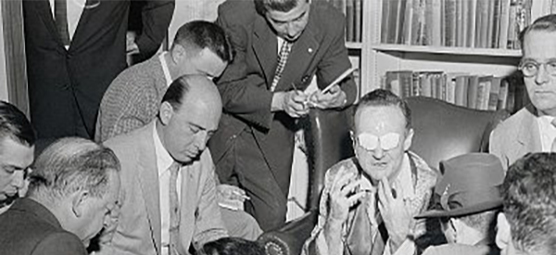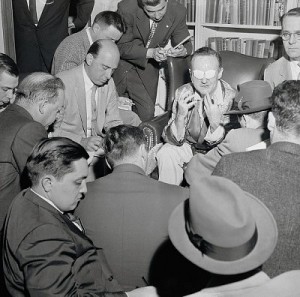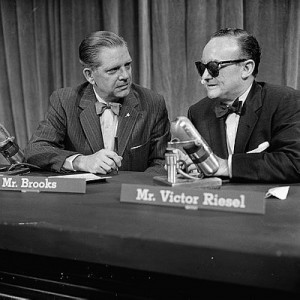Blinded by acid
Over sixty years ago this month, columnist Victor Riesel lost eyesight in Mob-ordered acid attack

On April 2, 1956, Charles Tuso, former armed robber and associate of New York labor racketeer Johnny Dio, entered a Lower East Side candy store at 171 Eldridge Street owned by ex-burglar Gondolfo “Shiekie” Miranti.
Tuso “asked me if I wanted to make a $1,000,” Miranti would tell the FBI several months later. “I told him, ‘It depends.’ Tuso told me the job was to throw acid at somebody. He didn’t tell me who. I told him ‘I’ll let you know.’ Then he left.”
The meeting of the two low-level hoodlums set in motion a foolhardy act that would bring national attention to the brutality of organized crime at a time when Johnny Dio was using fake “paper” union locals to gain votes for Jimmy Hoffa’s campaign to replace Dave Beck as president of the International Brotherhood of Teamsters.
On the morning of April 5, a troubled two-bit pimp named Abraham Telvi threw acid in the face of nationally syndicated newspaper columnist Victor Riesel. The attack, which permanently blinded Riesel, came days before Riesel was set to testify before the federal Special Rackets Grand Jury investigating the infiltration of gangsters in American labor unions.

Dio and Hoffa surely knew about Riesel’s upcoming closed-door testimony and that Riesel had been consulting with New York U.S. Attorney Paul Williams. Williams empaneled the rackets grand jury in an effort to go after underworld domination of New York’s garment industry where Dio worked his extortion rackets against employers and garment workers alike, and trucking, which mobbed-up Teamsters boss Hoffa claimed as his.
But that wasn’t all the racketeers knew about Riesel. He had been writing about national labor affairs, frequently against racketeering by gangsters such as Dio, since the 1940s. By 1956, his labor column was published in 193 newspapers. Riesel was just as fervent about ridding unions of organized crime as he was against communism. His statements railing about communism, a top political issue in the 1950s, got Riesel in well with FBI Director J. Edgar Hoover. Hoover was so grateful that he frequently leaked FBI information to Riesel. And when Riesel was blinded, Hoover sent his G-men in to investigate.
Hours before the April 5 acid attack, Riesel had finished a stint as guest host at radio station WMCA in Manhattan in place of late-night talk show host Barry Gray. The topic of discussion during the show was William DeKoning Jr., whose story was remarkably similar to what Dio was trying to do for Hoffa that year.
DeKoning headed Local 138 of the International Union of Operating Engineers in Long Island, New York. He had succeeded his father, William Sr., who had stepped down years before because of an extortion conviction. DeKoning Jr. was himself convicted of extortion in 1953 and barred for a year from the union. He came back in 1954 and now was trying to give his dad another chance to make it to the top.
Riesel had lately in his columns blasted the junior DeKoning for allegedly colluding with notorious labor racketeer and convicted extortionist Joseph Fay to reinstate DeKoning Sr. as union president. During the radio show the evening of April 4, Riesel had as his guests two members of the Operating Engineers local opposed to the DeKonings.
But the assault on Riesel had been in the works since April 2 when the columnist started guest hosting for Gray.
“Shiekie” Miranti, in his statement to the FBI, said that after Tuso left his candy store on April 2, Miranti’s neighborhood friend Dominic “Nick” Bando arrived. Miranti described Bando as “starving” for money. He asked Bando if he was interested in the acid-throwing contract and Bando said he would see if he could make it work. The fee for the job was set at $500. Miranti insisted that neither of them knew that the intended victim was Riesel.
In another statement to the FBI, local hoodlum Joseph “Joe Pilo” Carlino said he met with Nick Bando on the street that week. Bando asked if he knew of anyone interested in a contact for “beating someone” for brothering another man’s wife.
Right then, Carlino said he noticed his friend Abe Telvi lumbering down the street. He pointed to Telvi and said to Bando, “There’s a crazy kid who’s hungrier than I am.” He introduced Telvi to Bando, who explained the contract job to Telvi as having “to throw a few punches and put a guy out of commission for 10 days.” The fee was $500, but he would have to kick $200 back to Carlino. The guy to be beaten was a columnist named “Marshall.” Telvi agreed. Bando informed Miranti the deal was on.
Word traveled fast among the small-time crooks in the Lower East Side. Later during the night of April 2, according to Miranti, seven or nine men were playing cards in his Eldridge Street candy store when in walked Johnny Dio with Tuso. The guys were impressed that Miranti knew Dio, to them a name gangster.
“Dio asked me if I was interested in the deal,” Miranti said. “I told him yes. So he told me Charlie Tuso would see me later about things. Before Johnny Dio left, he gave me $50 cash.”
Tuso told Miranti that “somebody would be in later with the acid.” About midnight, a man known as “Skinny” came to the store “with a paper bag with a bottle of acid in it,” Miranti said. “The bottle was a small brown bottle full of acid.” Skinny left without saying anything.
In his statement to the FBI, Carlino said that Telvi told him that Miranti had given him the bottle of sulfuric acid and remarked “that throwing acid was better than throwing punches at a guy, it’s faster, it’s quicker and you just throw it and run.”
The plan was for Miranti to meet Telvi at Delancy and Norfolk streets. Miranti would drive Telvi to Hutton’s restaurant in the same building as the WMCA radio studio at 47th and Lexington. Miranti claimed that Tuso told him to drive to Hutton’s and look for the targeted man. Miranti said he and Bando went to the bar at Hutton’s. He also said he brought Telvi there. They had a drink and Miranti pointed out Riesel to Telvi.
“He (Tuso) didn’t tell me it was Riesel,” Miranti claimed. “He told me it was a short guy with glasses who was announcing that night.”
Miranti also insisted that “I told Abe to be sure he didn’t blind the guy.”

A bartender at Hutton’s later told the FBI that he saw Miranti (identified from a photograph) in the bar at least twice after Riesel’s radio shows before April 5. The bartender also identified Telvi as present in the bar before the attack. The men stuck out as not looking like the typical customers at Hutton’s, he recalled.
The conspirators knew that Riesel, after having a drink at Hutton’s following the show, liked to eat at Lindy’s restaurant on Broadway between 49th and 50th streets. Riesel, his assistant Betty Nevins and his associate Abe Savage left Hutton’s at 2:10 a.m. on April 5. Nevins drove her car with Riesel and Savage inside to Lindy’s. She parked on West 51st Street.
Carlino said that Miranti was in Lindy’s and walked out the front door just before Riesel’s party, which left the restaurant at 3 a.m. Savage walked another way as Riesel and Nevins went to Nevins’ car. Telvi was hiding near the car in the shadows of the entrance to the Mark Hellinger Theater.
The details of what happened next varied with the people who related what they said Telvi told them. Telvi called out Riesel’s name or asked Riesel for the time before chucking the acid into the columnist’s face. However it went down, drops of the highly corrosive acid fell onto Telvi’s face and neck, producing noticeable burns on his skin.
Carlino said that Telvi “threw the acid, pulled his arm back and threw some more acid. The acid did not all come out of the bottle on the first throw, and when he pulled his arm back to throw it a second time, some of the acid splashed on his, Telvi’s, face and on his clothes.”
Riesel clutched his face in agony. A shocked Nevins led him back to Lindy’s where an ambulance was dispatched to take him to a hospital. Meanwhile, Telvi ran across 51st Street. At one point, two police officers stopped him and asked why was running. He told them two Puerto Rican men had chased him with a knife. The cops let him go. He took a cab and arrived back at the Lower East Side at 4 a.m. Carlino said he saw Telvi hold a handkerchief to his face and mention he was in pain from the spilled acid.
Miranti stated that later in the morning after Riesel was injured, he met with Johnny Dio, Dio’s brother Tommy and Charlie Tuso at the Forsythe Boys Club over a bar at Rivington and Forsythe streets. “When I told them the job was done. Johnny Dio gave me $500 in cash,” he said.
Later that morning, at Carlino’s apartment, Miranti and Bando came to give Telvi the $500. Telvi in turn handed Carlino $150 of it. They later gave Telvi $100 more to replace his damaged clothing. Telvi told others that the conspirators promised he would receive $200 a month for life and possibly ownership of a bar for completing the contract.
But he was bothered when people he knew asked about the marks and scabs on his face and neck. The story about the acid attack on Riesel made national news. Riesel declared that organized crime was behind the attack. Robert F. Kennedy, legal counsel to congressional committees investigating organized crime, expressed to his wife, Ethel, his fear that the Mob might throw acid into the faces of their children. Kennedy then had his kids who were in school wait in the principal’s office to be picked up by car after classes.
In the coming weeks, Telvi caused trouble for his benefactors. He realized there was not going to be any more money. His friends advised him to stay inside during the day to avoid being recognized. Carlino arranged to have Telvi and Telvi’s girlfriend, Olga, stay in Ohio so that Telvi could be on the lam for an extended period and heal. But Telvi and Olga returned early to New York.
One witness said Telvi had commented that he would not have done the job if he knew the victim was Riesel, whom he had never heard of before. He said did not know the people who ordered the hit.
“I wonder who is it is, who is behind it,” witness Norma Carlino, Joseph Carlino’s wife, said Telvi told her. “If I knew I would go and talk to them. We sure were roped in.”
Others in the conspiracy felt duped because they were made to understand the victim would be roughed up, not doused with acid. Miranti said Nick Bando came to his candy store later in the morning of the attack “and told me the guy we had hit was Riesel. I asked him ‘Who’s Riesel?’ Nick explained to me who Riesel was. I was very worried because until then I didn’t know we had hit a big man.”
Carlino claimed to have been “hoodwinked” about the attack, which he described as “a beastly, disgusting act.” He, Bando and Miranti told their wives they feared they might be killed in the wake.
Then Telvi and Leo started demanding more money. Telvi received another $500 but wasn’t satisfied. He and Leo went to Arele’s New Romanian Restaurant where Carlino and other local hoods hung out and requested more money. Then Charlie Tuso entered the picture.
“Charlie the boss asked about Abe and Leo acting like ‘tough guys,’” Carlino said.
Tuso added, menacingly, “What do I have to do, put my finger in your mouth?” Carlino said he and Bando understood “that this was a threat.”
“Bando told me a short time after the visit from Charlie,” Carlino stated, “that arrangements were being made to take care of Abe Telvi and that the answer was to come in two weeks. Two weeks later, to the day, Telvi was killed.”
Telvi died from a shot to the head delivered in public on Mulberry Street on July 28, 1956. At the time, authorities did not tie the slaying to the attack on Riesel. After Telvi was buried in the Montefiore Cemetery in Queens, authorities heard he might have been the suspect, with tell-tale acid burns to prove it. His body was ordered exhumed but the medical examiner could not come to a definitive conclusion. Abe’s wounds may have healed by the time he died.
By mid-August, the FBI’s interviews with the conspirators produced enough evidence for felony charges against Gondolfo Miranti and Joseph Carlino for conspiracy to obstruct justice with Telvi. Similar charges were lodged against Johnny and Tommy Dio, Charles Tuso, Charles Carlino (Joseph’s brother) and Dominic Bando.
Miranti and Bando received prison terms of several years while Carlino enjoyed a suspended sentence. It was even better for Dio – all charges against him related to the Riesel attack were dropped. But in October, a federal grand jury indicted him on charges of racketeering and extortion. He served two years in prison, got out, was convicted on other felony charges in 1960 and served another three years. He was in and out of prison – running one scam after another along the way – until he died in custody in 1979.
Riesel, though totally without sight for the remainder of his life, continued writing his column using his skills in touch typing, often inveighing against organized crime in unions. He traveled the world and became a labor adviser to President Nixon in the early 1970s. He retired in 1990 and died in 1995 at age 81.
Feedback or questions? Email blog@themobmuseum.org





